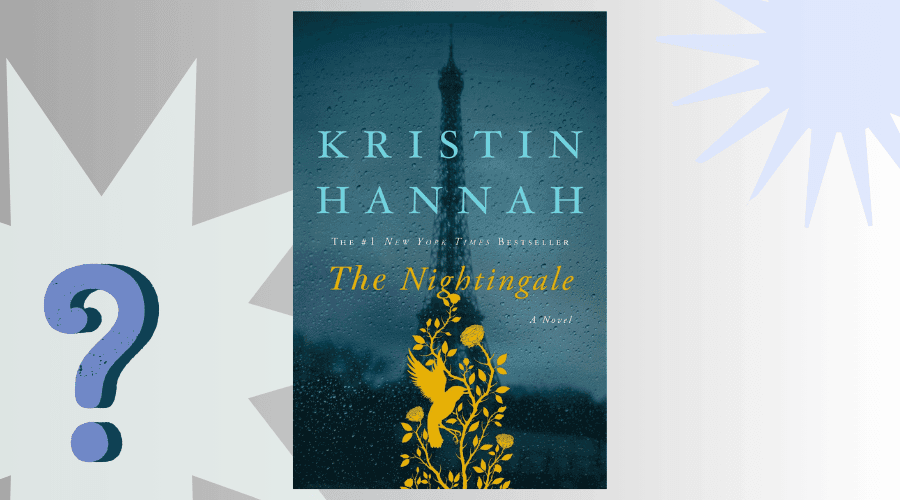The Nightingale by Kristin Hannah is a fantastic choice for a book club because it’s emotionally powerful, historically rich, and full of thought-provoking themes. Set in Nazi-occupied France during World War II, it follows two sisters, Vianne and Isabelle, who take very different paths in resisting the war. Vianne, a mother, is forced to make impossible choices to protect her daughter, while Isabelle joins the French Resistance, risking her life to fight the enemy. Their contrasting journeys create deep moral dilemmas, making this book a great discussion starter.
What makes The Nightingale perfect for a book club is its mix of gripping storytelling and meaningful themes. It explores survival, love, sacrifice, and the hidden roles of women in war, shedding light on the bravery of female resistance fighters. The novel is fast-paced and emotionally intense, ensuring that even readers who don’t typically love historical fiction will be completely drawn in. Plus, the relationships between the characters—especially the sisters—bring up compelling questions about family loyalty, resilience, and what it truly means to be courageous.
For an extra fun book club experience, you could theme the meeting around the book’s setting by serving French wine and pastries or discussing real-life women who inspired the novel. A debate about which sister made the braver choices—Vianne or Isabelle—could also lead to an engaging conversation. No matter how your club approaches it, The Nightingale is guaranteed to leave a lasting impression and spark some unforgettable discussions.
20 The Nightingale Book Club Questions and Answers
Here are 20 book club questions for The Nightingale by Kristin Hannah, along with potential answers to spark discussion:
1. The novel follows two very different sisters, Vianne and Isabelle. Which sister did you relate to more and why?
👉 It depends on the reader! Some may connect with Vianne’s cautious nature and devotion to family, while others admire Isabelle’s rebellious bravery.
2. How does the book portray the different ways people resist oppression?
👉 Isabelle takes direct action in the French Resistance, while Vianne’s resistance is quieter—hiding Jewish children and surviving under Nazi rule. Both forms are equally important.
3. What role does fear play in the choices Vianne and Isabelle make?
👉 Fear is a constant companion in war. Vianne is afraid of losing her daughter and her home, while Isabelle fears living a life of inaction. Their choices are shaped by what they fear most.
4. How does the war change Vianne over the course of the novel?
👉 At first, she is passive and wants to believe that compliance will keep her safe. But as she experiences loss and cruelty, she learns to fight back in her own way.
5. Isabelle takes a more aggressive role in resisting the Nazis. Do you think she was reckless or courageous?
👉 Both! She’s incredibly brave, but she also puts herself in extreme danger without always considering the consequences.
6. What do you think was the hardest decision Vianne had to make?
👉 Probably when she had to sleep with Beck to protect her children. It was a heartbreaking moment that shows the impossible choices women had to make during wartime.
7. How did the Nazi occupation impact Vianne’s sense of morality?
👉 She is forced to make compromises she never imagined, like forging papers for Jewish children. War pushes her to redefine right and wrong in order to survive.
8. Why do you think Isabelle was so drawn to the Resistance?
👉 She had always felt like an outsider in her family, and the Resistance gave her a purpose and a way to prove herself.
9. The sisters have a complicated relationship. How did their bond evolve throughout the story?
👉 They start off distant—Vianne sees Isabelle as reckless, and Isabelle sees Vianne as weak. But by the end, they recognize each other’s strength and sacrifice.
10. What role does love play in the novel?
👉 Romantic love (Isabelle and Gaëtan), familial love (Vianne and her daughter), and the love of country all drive the characters to make difficult choices.
11. Do you think Captain Beck was truly different from other Nazis?
👉 He seemed more humane than many, but at the end of the day, he was still an occupying soldier complicit in the regime’s actions.
12. Why do you think the novel focuses so much on women’s roles in war?
👉 Because their sacrifices and contributions are often overlooked. The book highlights how women fought, suffered, and survived in ways that history doesn’t always recognize.
13. What did you think of the dual timeline structure? Did it enhance the story?
👉 Yes! The present-day sections add suspense and emotional weight as we discover who survived and how the war shaped them.
14. How did the setting of France impact the tone of the book?
👉 The beautiful, peaceful countryside contrasts with the horrors of war, making the occupation feel even more tragic.
15. What did you think about the ending? Was it satisfying?
👉 It’s heartbreaking yet hopeful. We see the lasting impact of the war, but also how love and survival endure.
16. What moment in the book shocked or moved you the most?
👉 Many readers are devastated by Isabelle’s fate, Vianne’s sacrifice, or the brutal treatment of Jewish children.
17. What do you think was the main message of the book?
👉 That heroism comes in many forms, and even in the darkest times, love and resilience prevail.
18. How does The Nightingale compare to other WWII novels you’ve read?
👉 It stands out because it focuses on the women’s perspective, which isn’t always explored in war fiction.
19. How did the book change your understanding of women’s roles in WWII?
👉 It sheds light on how women were spies, rescuers, and survivors in ways history books often overlook.
20. Would you recommend this book to others? Why or why not?
👉 Absolutely! It’s emotional, beautifully written, and highlights an important piece of history.
The Nightingale: Discussion Topics
Here are five engaging discussion topics for The Nightingale that will spark deep conversations in your book club:
The Many Forms of Resistance in War
One of the most powerful themes in The Nightingale is the idea that resistance comes in many forms. Isabelle takes on a bold, active role in the French Resistance, risking her life to help downed Allied pilots escape Nazi-occupied France. Vianne, on the other hand, resists in quieter ways—hiding Jewish children, enduring the presence of Nazi officers in her home, and making unthinkable sacrifices to protect those she loves. Both paths are filled with danger and courage, but they also raise an important question: Is one type of resistance more valuable than another? Discussing how different characters approach resistance can lead to deep conversations about bravery, survival, and the choices people make in times of crisis.
The Role of Women in War
While many World War II stories focus on soldiers and battles, The Nightingale shines a light on the often-overlooked role of women during wartime. The novel explores how women took on immense responsibilities, whether by fighting in the Resistance, sheltering refugees, or simply enduring in a world that stripped them of power and control. Discussing this topic can lead to a greater appreciation for the real-life women who inspired the novel. How does The Nightingale challenge traditional war narratives? What new perspectives did the book offer on women’s contributions during WWII?
Moral Dilemmas and Survival
War forces people into impossible situations, and The Nightingale is filled with heartbreaking moral dilemmas. Vianne’s story, in particular, shows the impossible choices people had to make in order to survive. She is forced to let a Nazi officer live in her home, she forges documents to save Jewish children, and she ultimately sacrifices her own body for the safety of her loved ones. These moments bring up difficult questions about morality: Is survival always the right choice, no matter the cost? How do extreme circumstances redefine right and wrong? Discussing these ethical dilemmas can make for a deeply emotional and thought-provoking conversation.
Family, Love, and Sacrifice
At its core, The Nightingale is a story about love and sacrifice. The relationship between Vianne and Isabelle is complex—filled with tension, misunderstandings, and years of emotional distance. However, by the end of the novel, their love for each other becomes one of the most powerful elements of the story. The book also explores different forms of love, including romantic love (Isabelle and Gaëtan), parental love (Vianne and her daughter), and even love for one’s country. Discussing these themes can help book club members reflect on the sacrifices made in the name of love and how those sacrifices shape the characters’ journeys.
The Lasting Impact of War
The novel’s dual timeline structure allows readers to see how the war continues to affect its survivors decades later. Even after the fighting has ended, the trauma, loss, and scars remain. Vianne, now an older woman, carries the weight of her past decisions, while the full impact of Isabelle’s actions is only revealed in the final chapters. This raises questions about the long-term psychological and emotional effects of war. How does The Nightingale illustrate the ways people continue to live with their pasts? Do stories like this help keep history alive, and why is it important to remember these experiences?

